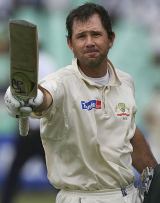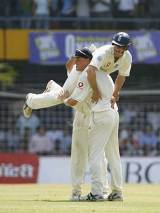From one Ashes to the next
Seven-and-a-half months on from the Ashes, Cricinfo explores how England and Australia have prospered since that balmy day in South London?
Will Luke
18-Apr-2006
218 days have passed since England's cricketers were lauded as the heroes of the nation. In another 218 days, Michael Vaughan and Ricky Ponting will meet in the middle at Brisbane to toss the coin and mark the start of the 2006-07 Ashes. Seven-and-a-half months on, how have the two teams prospered since that tense finale in South London?
|
|

|
If statistics are anything to go by, Australia are streets ahead of England. They have won 9 of their ten Tests since the Ashes (11, if you include the ICC Super Test debacle) whereas England have just a single victory in the six Tests that they have played.
Stats don't tell the whole story, however. Two days after the Ashes, when England were drinking London dry, Dennis Lillee called for the sacking of Ricky Ponting: "..the coach, the manager, the captain and support staff must all be held accountable for this disaster," he wrote. And he went on: "If Australia want to regain the Ashes they would dramatically improve their chances by appointing Shane Warne as captain."
Ponting was a wanted man; for the first time in a generation, an Australian captain was lambasted not only for losing the Ashes but for his tactical decisions as a leader. Ponting later revealed that he had no plans of handing over the reins, and consider what he has achieved since: in 10 matches, he's scored 1292 runs, hit seven hundreds and five fifties. To witness Ponting's batsmanship this southern-hemisphere summer has been to watch a man of rare talent and even rarer backbone. You would scarcely believe that just seven months earlier he had become the first Australian captain in 16 years to have his fingers prised from the urn. After sweeping aside West Indies, his team bullied South Africa - who admittedly should have put up a better fight - into two series defeats in the space of a couple of months.
Ponting's greatness is confirmed then. What of his other Ashes squad though? Four were discarded immediately after September: Damien Martyn, Michael Kasprowicz, Jason Gillespie and Michael Clarke all got the chop. Impressive though their replacements were - Brad Hodge struck a magnificent double-hundred in the first Test against South Africa - the selectors have since recalled all of their Ashes cast-offs, most recently Gillespie for the tour to Bangladesh. Cricket Australia's loyalty-card scheme brings with it rich rewards, and no less responsibility. These men are charged with the role of regaining the urn.
England's path has proved trickier. Widely expected to be too strong for Pakistan before Christmas, they fell foul of their own lofty expectations. They were tired, jaded from a summer of monumental achievements and the alien feeling of Ashes euphoria. They ought to have won the first Test at Multan, but let their opponents slide from beneath them. If the wheel nuts were loosened by Pakistan, in India they were wrenched off: a catalogue of injuries, including Michael Vaughan, Simon Jones and Marcus Trescothick, forced them to rip up their pre-series plans.
|
|

|
A triplet of debutants for the first Test at Nagpur didn't send shivers down India's spine yet it was they who escaped with a draw. Alastair Cook, flown from the Caribbean where he was representing England A, caressed 60 and 104 on debut and looked every bit a Test opener. Monty Panesar bowled bravely, famously claiming his hero, Sachin Tendulkar, as a first scalp. And having only captained his county a handful of times, Andrew Flintoff rose to the challenge of replacing Vaughan, proving himself to be not only tactically astute but a born leader of men.
After losing the second, England's young team prospered emphatically in the third Test at Mumbai to square the series. The victory lacked the glitz and historical significance of the Ashes, but it was no less important. Even Duncan Fletcher was moved to label the win as 'a huge achievement...[it's] close to the Ashes'. It demonstrated England's strength in depth; young cricketers with bottle, nerve and immense talent were performing immediately. It takes some courage, not to mention cockiness, to dance down the pitch to your fourth ball in Test cricket as Owais Shah did.
For all Australia's victories in the last few months, they have done so with a largely ageing team. Although Stuart Clark has proved an admirable replacement for Glenn McGrath, who missed Australia's recent tour of South Africa to care for his wife, he is 30. "There are few, if any, ready replacements in the domestic competition," Bob Simpson, the former Australia coach, complained in the Indian magazine Sportstar. Simpson criticised the Australian selectors who he felt "were forced into this situation by the worrying realisation that there is a shortage of younger players with the skill and application to bridge the gap between the first-class and Test levels."
However, there is no debate as to where Australia's focus lies: their primary aim - if not responsibility - is to regain the Ashes by hook or by crook. After walloping the World XI in the Super Series, Ponting admitted that he never had any thoughts of standing down from the captaincy. "I just thought, well, they're only out on loan, the Ashes. It's less than 18 months away, and then we'll have them back." It was uttered with ominous sincerity.
While Australia put their feet up, England must strap on their boots. Their summer starts in just a few weeks with three Tests against Sri Lanka, four versus Pakistan and another ten one-dayers before the Champions Trophy. It gives England's broken five - Vaughan, Giles, Jones, Trescothick and Steve Harmison - time to recover and regain form. Equally, the tightly packed schedule increases the fear of burnout.
The next 218 days might not determine the outcome of the 2006-07 Ashes, but it will give a fairly good indicator of how the teams are shaping up. We're halfway there: the countdown has begun.
Will Luke is editorial assistant of Cricinfo